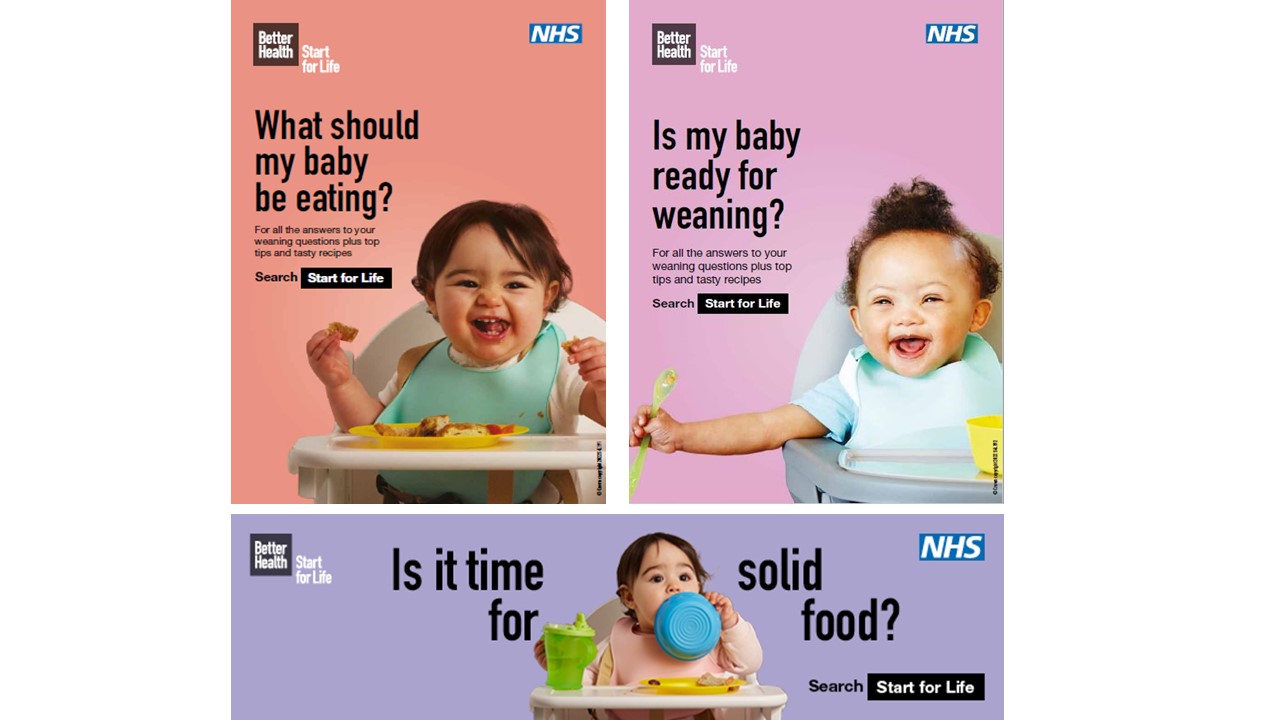Early Years Marketing Materials & Promotions
This page is dedicated to marketing and promotion materials in relation to childcare costs, funded early education, little learners, and the early years and childcare workforce. Here you can find useful leaflets, posters and social media content, please feel free to use these materials when communicating key marketing messages.
Physical Activity Guidelines For Children
Being physically active every day is important for the healthy growth and development of babies, toddlers and pre-schoolers.
For this age group, activity of any intensity should be encouraged, including light activity and more energetic physical activity.
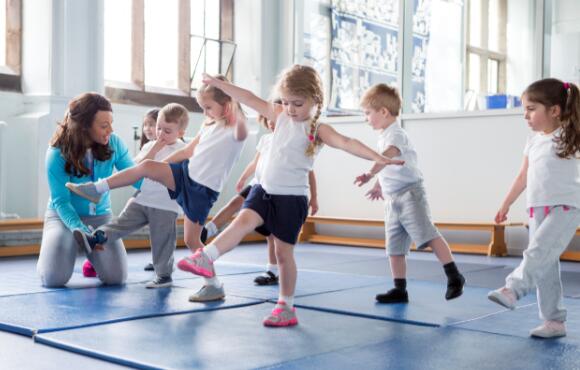
Babies (under 1 year)
Babies should be encouraged to be active throughout the day, every day, in a variety of ways, including crawling.
If they're not yet crawling, encourage them to be physically active by reaching and grasping, pulling and pushing, moving their head, body and limbs during daily routines, and during supervised floor play.
Try to include at least 30 minutes of tummy time spread throughout the day when they're awake.
Once babies can move around, encourage them to be as active as possible in a safe and supervised play environment.
For more ideas, see how to keep your baby or toddler active.
Toddlers (aged 1 to 2)
Toddlers should be physically active every day for at least 180 minutes (3 hours). The more the better. This should be spread throughout the day, including playing outdoors.
The 180 minutes can include light activity such as standing up, moving around, rolling and playing, as well as more energetic activity like skipping, hopping, running and jumping.
Active play, such as using a climbing frame, riding a bike, playing in water, chasing games and ball games, is the best way for this age group to get moving.
Pre-schoolers (aged 3 to 4)
Pre-schoolers should spend at least 180 minutes (3 hours) a day doing a variety of physical activities spread throughout the day, including active and outdoor play. The more the better.
The 180 minutes should include at least 60 minutes (1 hour) of moderate-to-vigorous intensity physical activity.
Children under 5 should not be inactive for long periods, except when they're asleep. Watching TV, travelling by car, bus or train, or being strapped into a buggy for long periods are not good for a child's health and development.
All children under 5 who are overweight can improve their health by meeting the activity guidelines, even if their weight does not change. To achieve and maintain a healthy weight, they may need to do additional activity and make dietary changes.
Physical activity ideas for under 5s
All movement counts. The more the better.
- tummy time
- playing with blocks and other objects
- messy play
- jumping
- walking
- dancing
- swimming
- playground activities
- climbing
- skipping
- active play, like hide and seek
- throwing and catching
- scooting
- riding a bike
- outdoor activities
For more information please follow the link: Physical activity guidelines for children (under 5 years)
Free Time To Read Packs
Time to Read from BookTrust, provides a free book for every reception-aged child in England. Time to Read aims to spark an interest in reading and encourage children to read regularly. These will be delivered directly to schools during November and December 2022. They will be labelled as a free pack for reception classes from BookTrust.
BookTrust is the UK’s largest reading charity.
Each Time to Read pack will include a copy of We’re Going to Find the Monster by Malorie Blackman and Dapo Adeola and will also have tips and activity ideas for both teachers and parents.
Find out more about Time to Read
Schools do not need to place an order and should automatically receive their packs. All administration for the scheme in Slough has been done in advance by the library service. If you do not receive enough packs, you can contact the Time to Read Aftercare Team at timetoread@booktrust.org.uk
For a visit from Slough Libraries to compliment the Time to Read programme, please contact Alison Beer, Principal Libraries Outreach Officer (Children and Young People) alison.beer@slough.gov.uk.
CREC | Moonbeams Early Years Podcast
CREC (Centre for research in Early Childhood) is delighted to launch and host the Moonbeams Early Years Podcast series created and funded by Arts Connect.
Each episode is hosted by Pepita Hanna, Associate Director, Partnerships and Investment, Arts Connect and Peppy Hill, Creative Practitioner (Early Years; Higher Education; Families; Communities); certified Play Therapist; Filial Play Coach and Clinical Supervisor for the Creative and Arts Therapies.
All three episodes will combine to create a series of exciting conversations on creativity in early childhood, with education professionals, artists and academics working in the early years, brought to you by Arts Connect.
For more information about the podcasts, please follow this link: Moonbeams Podcasts - EY & Creativity
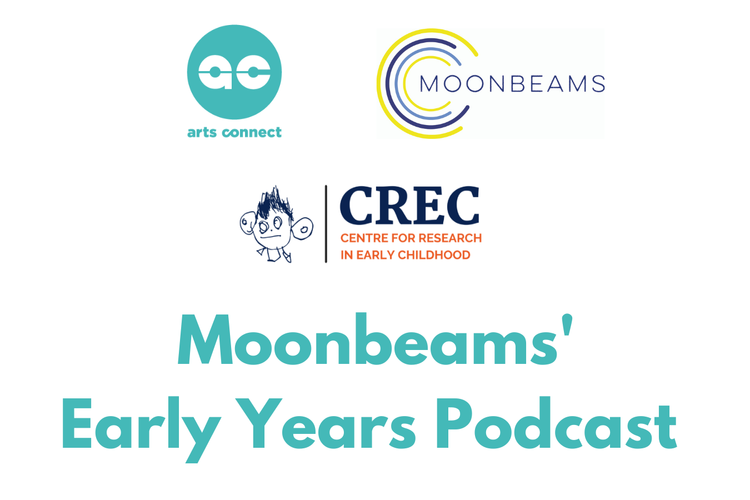
Birth To 5 Matters | Characteristics Of Effective Learning
Birth to 5 Matters (guidance by the sector, for the sector) have published a new document - Characteristics of Effective Learning - The Golden Thread in the EYFS (10 May 2023). For the full document please follow this link: Characteristics of Effective Learning – The Golden Thread in the EYFS – Birth To 5 Matters

Developing Childrens Reading Skills With Phonics
“Developing children’s reading skills with phonics” has just been published on the Teaching blog.
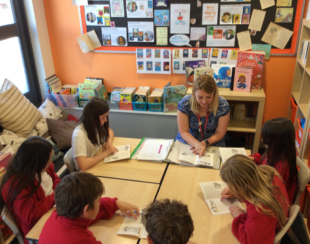
Janine Ashman, Director of Learning and Unlocking Excellence English Hub Lead at St. Peter’s primary school in Somerset tells us about how using a phonics scheme has improved learners’ reading skills.
Read the new post: https://teaching.blog.gov.uk/2023/05/16/developing-childrens-reading-skills-with-phonics/
Safety Alert Issued For Baby Self-Feeding Pillows
There has been an urgent safety alert issued by the government website about baby self-feeding pillows. Self-feeding pillows/prop feeders present a risk of serious harm or death from choking or aspiration pneumonia.
Follow the link for the full article Urgent Safety Alert Issued for Baby Self-Feeding Pillows
Further to the safety alert for self feeding pillows, there are a few more products that present a risk of serious harm or death from choking or aspiration pneumonia for your attention. This is a request to to share the below links widely through your networks to reach practitioners.
Gov.UK | Safety Alert | Baby Self Feeding Products.
Gov.UK | Urgent Safety Alert Issued | Baby Self Feeding Products
Our early years campaigns provide parents with support and advice on introducing solid foods to their baby, during what can be a confusing time. Better Health Start for Life will continue the Introducing Solid Foods campaign in the new year with planned relaunch on 13th February 2023.
As part of the campaign, the 'weaning hub1' is available on the Better Health Start for Life website to help parents introduce solid foods to their baby. Packed with NHS-endorsed advice, videos and tips, plus simple, healthy recipes, it puts everything parents need to know in one place.
Download and order a range of free digital and print resources from the Campaign Resource Centre, available now. As well as posters, web banners and digital screens to help promote the campaign in your area, you can also order a weaning1 wallchart. This resource is perfect for Health Visitors and other Health and Care professionals who speak directly to mums and parents about introducing solid foods. This resource is also available in an Easy Read version which can help with communicating with those with learning disabilities or for whom English is not their first language.
Follow the link for more information: Better Health Start for Life Introducing Solid Foods | Campaigns | Campaign Resource Centre (dhsc.gov.uk)
The 'weaning hub1' is available on the Better Health Start for Life website to help parents introduce solid foods to their baby. Packed with NHS-endorsed advice, videos and tips, plus simple, healthy recipes, it puts everything parents need to know in one place
Amanda Spielman Speech | The Big Conversation 2023
Please see link to Amanda Spielman, Ofsted's Chief Inspector’s speech where she reflects on the last year in early education and explores the features of our early years research reviews. Published 30.01.23
Includes:
- The effects of missing early education
- Best start in life
- Language and communication
- Early years curriculum
Amanda Spielman’s speech at the Big Conversation, 2023 - GOV.UK (www.gov.uk)
Early Excellence | Early Years and KS1 Curriculum Podcast
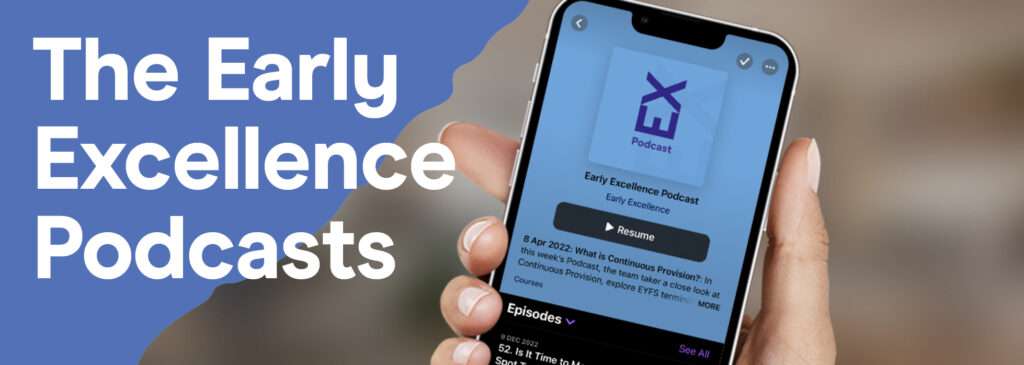
The Early Excellence podcasts are platforms for learning from leading professionals in Early Years and Key Stage 1 education. If you work in a school, nursery or preschool setting, the Early Excellence Podcasts will provide you with both practical advice for managing your school, setting or classroom, as well as thought-provoking content and insights about early childhood education.
For more information, please follow this link: Early Years and KS1 Curriculum Podcast | Early Excellence
A new article has been added on 18 May 2023, please follow this link to read the full article: Transition to Year 1 - Getting it Right from the Start | Early Excellence
Froebel Trust | Froebelian Approach To Early Education
If you've always wanted to know more about a Froebelian approach to early education - and how you might set out to develop practice in your school or setting - then the Froebel Trust podcast is for you!
The first ever Froebel Trust podcast series launches today - created for educators and early years leaders interested in finding out what a Froebelian approach to early education is all about.
Listen in on this brand new series of inspiring conversations all about early learning and Froebelian practice. The first three episodes explore:
- how to start out on a Froebelian journey in your school or setting
- what training and resources you might need and where to find them
- how a Froebelian approach might support your work with young children and families.
For more information follow the link: Froebel Trust
National Literacy Trust | Words For Life

Talking to your baby or child when out and about...
The walk and talk trail contains ideas and tips to help you chat to your baby or child more while you are out and about.
The walk and talk trail and additional activities on this page will support you to introduce language to your baby or child. This will help them begin talking, or help them develop language and build vocabulary even if your child is already very chatty.
90% of your child’s brain has developed by the time they are five years old. You can help this development by using as many opportunities as you can to talk to them, listen to them and introduce them to new things.
The walk and talk trail will help you get started. The tips, advice and activity ideas below will also support their communication skills.
For more information, please follow this link: Talking to your child when you’re out and about | Words for Life
Understanding ADHD in Early Years
This webinar is mainly for parents and carers, to give them strategies to support them at home:
It will explore:
- The traits of ADHD in the early years, including the "Early Alerts" for the condition
- Introducing parents/carers to the strategies to support the key characteristics of ADHD in the early years
You can still register, and a recording of the session will be emailed to them after the webinar has taken place.
https://www.witherslackgroup.co.uk/resources/understanding-adhd-in-early-years/
https://pages.witherslackgroup.co.uk/understanding-adhd-early-years
Sun Safe Nurseries | Resources

A national accreditation programme that nurseries and preschools can sign up to. It provides early year settings with free resources and education material to support them as they ensure they are ‘sun aware’ about the damage of UV, and the prevention of skin cancer. For more information please follow this link: Sun Safe Nurseries
Child Accident Prevention Trust | Resources

The Child Accident Prevention Trust (CAPT) is the UK’s leading charity working to reduce the number of children and young people killed, disabled or seriously injured in accidents.
We exist because accidents are a leading cause of death and serious injury for children and young people. Many of these accidents can be prevented. Please see below useful leaflets.
DfE | New Oral Health Guidance
New oral health guidance from the Department for Education is now available on the Help for Early Years Providers website. The guidance aims to help early years practitioners meet the oral health requirement in the Early Years Foundation Stage statutory framework.
Nearly a quarter of 5-year-olds in England have tooth decay – but this is largely preventable. New oral health guidance from the Department for Education is now available on the Help for Early Years Providers website.
The guidance:
· explains the importance of good oral health for early years children
· helps practitioners to meet the oral health requirement in the Early Years Foundation Stage statutory framework
· includes practical tips and activities to use in early years settings
· links to further reading and resources
For more guidance on supporting children in the early years, visit the Help for Early Years Providers website.
NHS Berkshire Healthcare | Speech & Language Therapy
Our Early Years team are pleased to introduce our monthly online workshops covering early language development. They are designed for parents and carers and those working within early years settings. Please see below for more information on the sessions and how to register.
Communication Foundations
Does your child struggle to pay attention to you?
Does your child pay fleeting attention to you or their toys?
Does your child find it difficult to allow or tolerate you sitting next to them?
Does your child struggle to use words to communicate?
The Early Years Speech and Language Therapy Team will be talking about different strategies that may support your child.
Communication Building Blocks
Does your child have a limited number of words?
Does your child only use short phrases?
The Early Years Speech and Language Therapy Team will be sharing ways you can support your child’s early language development.
Scaffolding Communication
The Early Years Speech and Language Therapy Team will provide an overview of how we can use gestures, objects and pictures to support language development.
Important information about your personal data
When you visit the link for the training session, Berkshire Healthcare Foundation Trust will use the information you provide for service development purposes. Your email address will only be accessible to those Berkshire Healthcare staff involved in the delivery of the training.
Personal data will be deleted after the webinar, your information will not be shared with any third party and you will not be contacted by Berkshire Healthcare as a result of this training, unless safeguarding concerns arise from the session around your own, or your child’s wellbeing. If this is the case, data will be used to escalate appropriately to the safeguarding team.
Cameras and microphones will remain disabled throughout the session, however, please note that if you do not select ‘Join as a guest’ at the time of the training, your name will be visible to other attendees. Please select ‘Join as a guest’ when you enter.
For more information follow the link: Speech and Language Therapy | Children Young People and Families Online Resource (berkshirehealthcare.nhs.uk)
About HENRY
At HENRY we are passionate about babies and children getting the best possible start in life. This means supporting the whole family to make positive lifestyle changes, creating healthier and happier home environments, and building healthier communities.
Over the past 12 years we have supported thousands of families to transform family life for the better in all sorts of ways – including improved nutrition, emotional wellbeing, parenting skills, breastfeeding, and getting more active. We have worked with over 15,000 health and early years practitioners and collaborated with NHS trusts, local authorities, and many other partners.
A healthy start for a brighter future
For more information, please follow this link: Homepage | HENRY



